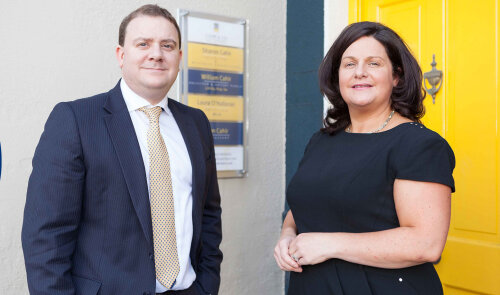Best Birth Injury Lawyers in Ennis
Share your needs with us, get contacted by law firms.
Free. Takes 2 min.
List of the best lawyers in Ennis, Ireland
About Birth Injury Law in Ennis, Ireland
Birth injury law covers cases where a baby or mother suffers harm during pregnancy, labour, delivery or immediately after birth as a result of substandard medical care. In Ennis, County Clare, people access maternity and neonatal services through local hospitals and regional services run by the Health Service Executive - HSE. When an injury arises that may be linked to clinical negligence, families may consider a legal claim to obtain compensation for medical costs, ongoing care, rehabilitation, loss of earnings and other losses, and to secure accountability and improvements in care.
Claims in this area are usually complex because they require medical expert evidence to show both that a breach of the appropriate standard of care occurred and that the breach caused the injury. Many birth-injury claims involve serious outcomes such as cerebral palsy, brain injury from oxygen deprivation, brachial plexus injury, fractured bones, or infection, and so they often require long-term planning and specialist input.
Why You May Need a Lawyer
A lawyer skilled in clinical negligence and personal-injury law can help in situations including:
- When a baby has suffered brain injury, cerebral palsy or other serious disability that may be linked to care during labour or delivery.
- If forceps or vacuum extraction appear to have been used incorrectly or without proper indication, causing trauma.
- When a delayed or inappropriate decision about caesarean section, induction, or monitoring appears to have caused harm.
- If there are concerns about failed fetal monitoring or a failure to recognise distress in the baby.
- When an infection or medication error around the time of birth has had serious consequences.
- If a baby's death has occurred and you need advice on coronial procedures, record-keeping, or potential civil claims.
- Where you need help obtaining medical records, arranging independent expert reports, or assessing the value of a claim for lifetime care and support.
Lawyers provide legal assessment, gather medical records, instruct medical experts, estimate future care needs and costs, negotiate with insurers or the State Claims Agency, and represent you in court if needed. They can also advise on non-legal routes such as complaints to the hospital, HSE or the Office of the Ombudsman.
Local Laws Overview
Key legal aspects relevant to birth-injury cases in Ennis and the wider Republic of Ireland include:
- Time limits: Personal-injury and clinical-negligence claims are subject to limitation periods. Generally, an injured person has two years to bring a claim from the date of knowledge of the injury. For children, the limitation period is usually extended - a child can bring a claim within two years of their eighteenth birthday. There are narrow exceptions in certain circumstances where the court may allow a later claim, but prompt action is always safer.
- Public-sector claims: If the alleged negligence occurred in a public hospital or against HSE staff, claims are usually handled through the State Claims Agency, which manages civil claims against the State. Private practitioners or private hospitals are dealt with through their own insurers.
- Evidence and experts: Clinical negligence claims depend on medical expert evidence to establish breach of duty and causation. Expect to obtain independent expert reports in obstetrics, paediatrics, neonatology and where relevant, physiotherapy, neurology and rehabilitation medicine.
- Damages: Compensation typically covers general damages for pain and suffering and special damages for financial losses and care costs. For serious lifelong injuries, awards may include large future-care and special-education packages, housing adaptations and assistive technology costs. Courts may also make provision for structured settlements or the appointment of trustees for monies awarded for a child.
- Complaints and investigations: Families can make formal complaints to the hospital and HSE. Unexpected deaths are investigated by the coroner. Separate civil claims do not prevent a family from pursuing complaints, inquests or disciplinary matters.
- Access to records: Under data-protection and health legislation you have a right to access medical records relevant to care. Solicitors often request records early as part of case assessment and evidence gathering.
Frequently Asked Questions
How long do I have to bring a birth-injury claim in Ireland?
Generally you have two years from the date you knew or ought to have known that the injury was linked to clinical care. For injuries to children, the limitation period normally runs from their eighteenth birthday, giving until they are twenty to start proceedings. Because circumstances vary and exceptions may apply, you should seek advice as soon as possible to avoid missing time limits.
Who pays if the negligence happened in a public hospital near Ennis?
If negligence occurred in a public hospital or involved HSE staff, the State Claims Agency normally handles the claim and any settlement or judgment is paid by the State. If a private practitioner or private hospital was involved, their professional indemnity insurer is usually responsible.
Can I complain to the hospital or HSE instead of taking legal action?
Yes. Making a formal complaint to the hospital or to the HSE patient liaison service is often the first step. Complaints can lead to explanations, apologies, internal investigations and changes in practice. Complaints do not prevent you from later bringing a civil claim. If you are unhappy with the HSE response you can also contact the Office of the Ombudsman for public-service complaints.
How do I get the baby or mother medical records I need?
You have a right to request copies of medical records relating to you or your child. Make a written request to the hospital records department or to the HSE. If difficulty arises, a solicitor can make formal requests, relying on data-protection and health-rights provisions, and can escalate matters where access is refused.
What types of compensation might be available in a birth-injury case?
Compensation can include damages for pain and suffering, past and future medical expenses, cost of ongoing care and rehabilitation, special equipment, home adaptations, loss of earnings, and care provided by family members. For children with life-long disabilities, awards often include sums for long-term care and education. An experienced solicitor will assess needs and instruct specialists to quantify future costs.
Will we need to see medical experts?
Yes. Independent medical experts are essential in establishing the standard of care, whether there was a breach and whether that breach caused the injury. Experts in obstetrics, neonatology, paediatrics, neurology and rehabilitation are commonly instructed depending on the nature of the injury.
How long does a birth-injury legal case usually take?
Timescales vary widely. Some cases settle within months if liability is clear and parties agree. Complex cases, especially where causation or quantum is disputed, can take several years to resolve because of the need for detailed expert evidence and to assess future care costs. If the case goes to court the process will take longer. Solicitors can often obtain interim or interim-type arrangements to help with immediate needs while a case proceeds.
Can I get legal aid for a birth-injury case?
Legal Aid Board assistance in Ireland is needs-based and subject to eligibility rules. Civil legal aid for clinical negligence is not always available. Many firms offer initial consultations and may discuss fee arrangements, including conditional-fee or contingency-style agreements, subject to professional rules. Ask a solicitor about available funding options and costs at the first meeting.
What should I do immediately after discovering a possible birth injury?
Take practical steps: keep a detailed record of events and dates, obtain and preserve medical records, make notes of conversations and witnesses, seek appropriate medical follow-up and rehabilitation, and get early legal advice so you know your time limits and options. Also consider making a formal complaint to the hospital or HSE while preserving evidence.
Does bringing a claim affect my ability to make a complaint or participate in an inquest?
No. Civil claims, complaints and coroners inquests are separate processes. Pursuing a civil claim does not prevent you from submitting a complaint to the hospital or HSE, and representation can be arranged for coronial proceedings. Each process has its own purpose and standards of proof.
Additional Resources
Helpful organisations and bodies for people in Ennis and County Clare dealing with birth-injury concerns include:
- Health Service Executive - for information on local maternity services, patient liaison and complaints processes.
- State Claims Agency - manages civil claims against the State for incidents in public hospitals.
- Medical Council - responsible for professional standards and complaints related to registered medical practitioners.
- Health Information and Quality Authority - regulates and inspects health and social-care services in Ireland.
- Office of the Ombudsman - deals with complaints about public services including HSE matters.
- Legal Aid Board - for information about legal-aid eligibility and civil legal representation.
- Citizens Information - offers general guidance on rights, entitlements and procedures.
- Charities and support groups that assist families of children with neurological or complex needs - for example groups supporting children with cerebral palsy, early-intervention charities and local disability support networks.
- Your local solicitors and clinical-negligence practitioners - to obtain case-specific legal advice and to help with records and expert evidence.
Next Steps
If you believe a birth injury has occurred and you need legal assistance, follow these practical steps:
- Act early - check limitation time limits and seek legal advice without delay.
- Obtain and preserve records - request all hospital and GP notes, maternity records, test results, scans and correspondence.
- Keep a detailed chronology - write down dates, times, names of staff and what happened. Note ongoing health issues and expenses.
- Seek medical follow-up - ensure the child and mother receive appropriate diagnostic assessments and treatment so needs are identified and documented.
- Contact an experienced clinical-negligence solicitor - arrange an initial consultation to discuss your situation, funding options and likely next steps. Ask about experience with birth-injury cases and local hospitals.
- Consider complaints and investigations - file a formal complaint with the hospital or HSE if appropriate, and be aware of coronial procedures where relevant.
- Prepare for expert assessments - your solicitor will usually arrange independent medical reports to assess liability and likely prognosis.
Getting clear legal advice early will help protect your rights, preserve evidence and give you the best chance of achieving an outcome that covers the child and family needs for the long term. If you are unsure where to start, reach out to a solicitor with clinical-negligence experience and explain your situation in detail.
Lawzana helps you find the best lawyers and law firms in Ennis through a curated and pre-screened list of qualified legal professionals. Our platform offers rankings and detailed profiles of attorneys and law firms, allowing you to compare based on practice areas, including Birth Injury, experience, and client feedback.
Each profile includes a description of the firm's areas of practice, client reviews, team members and partners, year of establishment, spoken languages, office locations, contact information, social media presence, and any published articles or resources. Most firms on our platform speak English and are experienced in both local and international legal matters.
Get a quote from top-rated law firms in Ennis, Ireland — quickly, securely, and without unnecessary hassle.
Disclaimer:
The information provided on this page is for general informational purposes only and does not constitute legal advice. While we strive to ensure the accuracy and relevance of the content, legal information may change over time, and interpretations of the law can vary. You should always consult with a qualified legal professional for advice specific to your situation.
We disclaim all liability for actions taken or not taken based on the content of this page. If you believe any information is incorrect or outdated, please contact us, and we will review and update it where appropriate.










